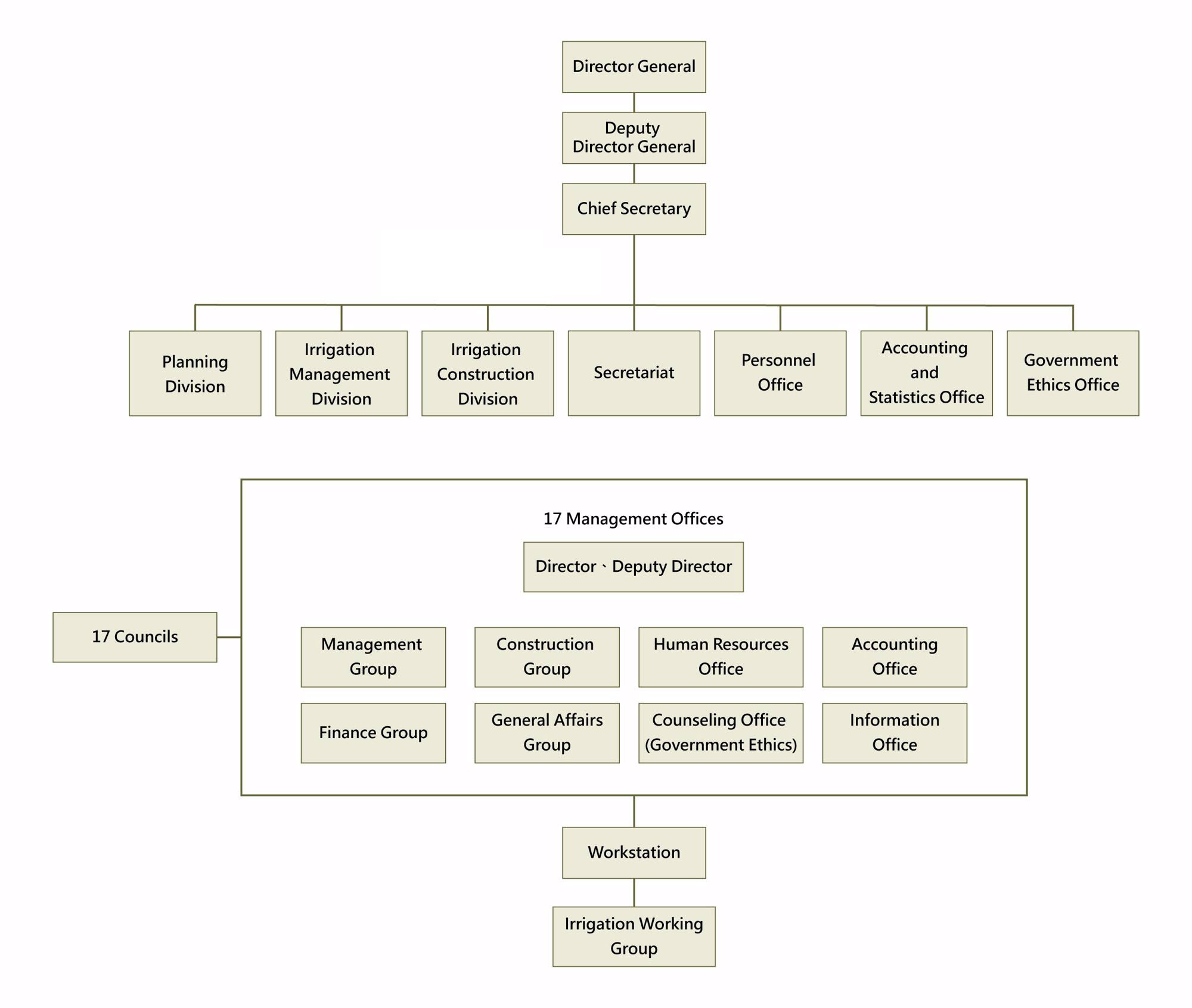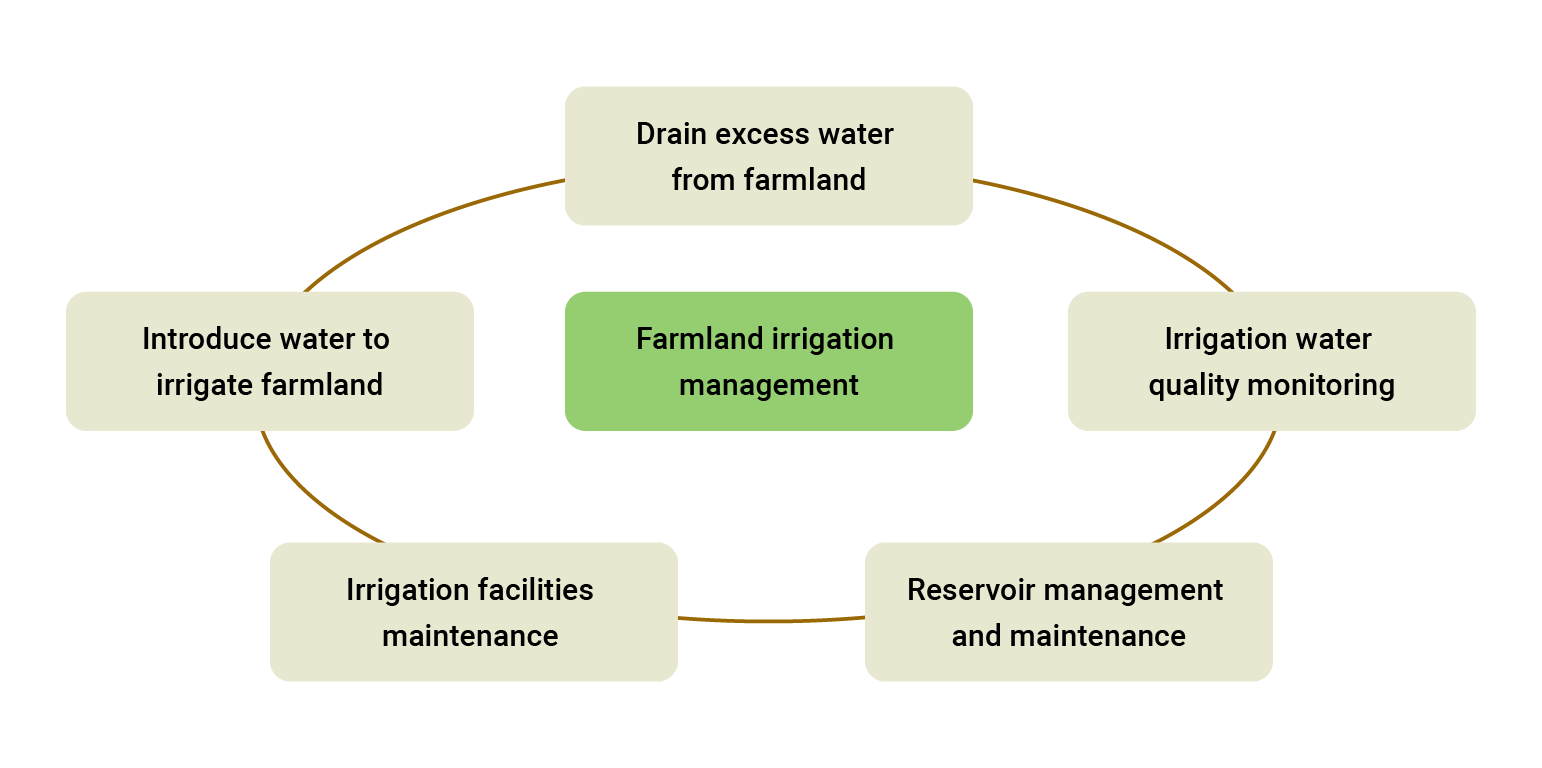Responsibilities
The Irrigation Agency is in charge of the following areas:
(1) Planning, formulating, executing and promoting farmland irrigation policies and regulations.
(2) Formulating and promoting the establishment, supervision, guidance and management rules for farmland irrigation operation management organizations.
(3)Farmland irrigation research and international exchange.
(4) Formulating, promoting and executing a system for the use, revenue, disposal and management of farmland irrigation operations funds.
(5) Planning, promoting and coordinating farmland irrigation resources surveys.
(6) Planning, executing and promoting agricultural irrigation water source construction.
(7) Planning, executing and promoting farmland irrigation disaster prevention and rescue operations.
(8) Planning, supervising, executing and promoting agricultural engineering renewal and improvement plans such as farmland irrigation, farmland drainage and farmland re-adjustment.
(9) Planning, executing, promoting and supervising agricultural irrigation water quality management, control and coordination of farmland irrigation water use, farmland irrigation facilities maintenance and management.
(10) Other matters related to Irrigation Agency related matters.
Duties and Services
The director is in charge of agency affairs, as well as directing and supervising subordinate personnel; the deputy director assists the director in handling agency affairs.
The Chief Secretary’s responsibilities are as follows:
1. Comprehensive review, drafting and issuing of documents.
2. Processing confidential and important documents.
3. Coordinating and negotiating the rights and responsibilities of units.
4. Organizing important meetings.
5. Other assigned items.
The Chief Engineer’s responsibilities are as follows:
1. Comprehensive review, drafting and issuing of Engineering Department documents.
2. Processing confidential and important department documents.
3. Coordinating and negotiating rights and responsibilities of department units.
4. Organizing important department meetings.
5. Other assigned items.
The teams and offices of the Agency include the following:
Planning Division, Irrigation Management Division, Irrigation Construction Division, Secretariat, Personnel Office, Government Ethics Office and Accounting and Statistics Office.
Wherein, the Personnel Office is in charge of Agency personnel matters; the Civil Service Ethics Office is in charge of civil service ethical matters; the Accounting and Statistics Office is in charge of annual budgeting, accounting and statistics matters; additionally, the responsibilities of the Planning Division, Irrigation Management Division, Irrigation Construction Division, Secretariat are in charge of are listed as follow:
1. Planning Division
(1) Planning, formulating and coordinating irrigation policies, guidelines and measures.
(2) Adopting, formulating and coordinating Irrigation Agency policy plans, medium, long-term and annual plans, technological plans and evaluating project planning.
(3) Publishing and guiding irrigation publications, research, exchange and coordination of international affairs.
(4) Guidance and assessment of Irrigation Agency foundation operations.
(5) Formulating and planning personnel policy, personnel hiring and training of farmland irrigation operation management organizations.
(6) Financial management such as the saving and use of farmland irrigation operation funds, revenue, disposal systems, and utilization, development assessment and implementation of asset investment plans.
(7) Adoption and interpretations of laws and regulations related to irrigation.
(8) Consultation and processing of petitions, lawsuits, and state compensation cases related to irrigation.
(9) Other planning related matters.
2. Irrigation Management Division
(1) Farmland irrigation investigation and planning of agricultural irrigation water resources.
(2) Planning, promotion and supervision of farmland irrigation operation management, irrigation technology development, planning, design and construction of irrigation information systems engineering projects, and planning, promotiong and supervisiongn training of associated personnel trainingl training.
(3) Allocation of agricultural irrigation water resources, coordinating, promoting and supervising water resources allocation during droughts to support daily and industrial water use.
(4) Planning, promoting, coordinating and supervising irrigation water quality management policies and water quality monitoring programs.
(5) Planning, promoting, coordinating and supervising inspections, banning, and sanctioning irrigation water pollution and planning, promoting and supervising training of associated personnel.
(6) Planning, promoting, supervising and coordinating irrigation water quality inspection and training of full-time inspectors.
(7) Supervision of farmland irrigation facilities maintenance, disaster prevention, emergency contingency operations and disaster emergency repair projects.
(8) Planning, design, promoting, coordinating and supervising farmland irrigation facilities, water intake (diversion) projects, management and maintenance of water storage and allocation facilities.
(9) Planning, design, promotion, experimental research and measures to save agricultural irrigation water, and planning, counseling and promotion of Irrigation Agency technician skills certification.
(10) Other Irrigation Agency management related matters.
3. Irrigation Construction Division
(1) Progress control, planning, coordination and supervision of farmland irrigation projects.
(2) Management, review, inspection and supervision of farmland irrigation project quality and occupational health and safety.
(3) Formulating, planning, coordinating and promoting farmland irrigation construction administration, project contract templates and construction specifications.
(4) Counseling, guiding, coordinating, promoting and supervising the construction, renewal and improvement of farmland irrigation projects.
(5) Coordinating, promoting and supervising agricultural irrigation water source projects.。
(6) Planning, coordinating, promoting and supervising regional facilities in farmland re-adjusted areas, construction and improvement of agricultural roads and waterway plans.
(7) Planning, coordinating, promoting and supervising agricultural production environment improvement projects and quality.
(8) Planning, coordinating, promoting and supervising natural disaster reconstruction of farmland irrigation facilities.
(9) Investigation, research, planning, supervising and promoting agricultural engineering manpower training and technical improvement.
(10) Other Irrigation Agency construction related matters
4. Secretariat
(1) Keeping official seals and managing documents and files.
(2) Proceedings, cashiers, finance, maintenance, procurement and other administration management.
(3) Management of assets such as offices, dormitories and official vehicles
(4) Planning, formulating, executing and evaluating legislative and local liaison, media and public relations policies.
(5) Other matters not the responsibility of other groups or divisions.

Personnel allocation
The statutory staff quota is 128 and allocated budget staff quota 78; in addition, there are 17 management offices.
The establishment of Irrigation Agency management offices is determined by geographic environment and economic interests, and they are named after the region or its water and irrigation channel system. There are currently 17 management offices in Taiwan and the central competent authority is the Irrigation Agency, Ministry of Agriculture.
1. Items handled by management offices
According to Article 18 of the "Irrigation Act," in order to arrange irrigation management in farmland water conservancy activity areas, the Competent Authority, may establish irrigation management organizations within its subordinate agencies, to handle the following matters:
(1) Distribution and management of farmland water conservancy water.
(2) Maintain orderly use of irrigation water and guidance of water conservancy committee affairs.
(3) Construction, management, improvement and maintenance of farmland water conservancy facilities.
(4) Disaster prevention and post-disaster response measures for farmland water conservancy facilities.
(5) Personnel management of professional staff in irrigation management organizations (hereafter known as farmland water conservancy personnel).
(6) Management of and revenue earning from assets belonging to the Farmland Water Conservancy Activities Operational Fund.
(7) Training and advanced study for professional staff in irrigation management organizations as mentioned in the preceding Paragraph shall he handled by a juridical person set up with funding provided by the Competent Authority.
(8) Regulations governing the establishment of irrigation management organizations as mentioned in Paragraph 1 of this Article, the scope of their authority, and other relevant matters shall be stipulated by the Competent Authority.
2. Farmland irrigation management
The main task of Irrigation Agency management offices is irrigation management. Under the increasingly difficult water resources development, these work in concert with government policies to strengthen the renewal and improvement of farmland irrigation facilities and promote the installation of water-saving pipeline irrigation facilities to effectively control the water source volume of each irrigation system. This optimizes deployment of operations, and prevents irrigation water from being polluted. During drought periods, water-saving measures are adopted to relieve shortages. In the monsoon period, irrigation facilities and paddy fields are used to fill the fields with excess river runoff water. Groundwater resources are replenished by soil infiltration in the fields, and the space built by the paddy field ridges is used to store rainwater for flood control. This also involves promoting synergic utilization of soil and water resources to achieve ecological harmony, ensure the sustainable use of soil and water resources, and maintain the sustainable development of agriculture. It provides direct and indirect functions and contributes to the ecological restoration and living environment of the region, serving three functions: production, sustaining local ecology and living conditions, which benefits not only "farmers" but "all citizens."
